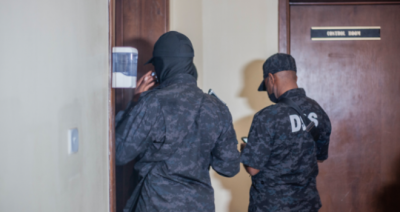There’s corruption-driven impunity in Nigeria’s DSS, police, military – U.S
The United States government says impunity worsened by corruption and weak judiciary is a “significant problem” in Nigeria’s police, military and the Department of State Services (DSS).
The US’ Department of State disclosed this in its 2021 country reports on human rights practices, which was released on Tuesday.
The annual report usually covers individual, civil, political, and worker rights as stipulated in universal declaration of human rights and other international agreements.
In the report, the US government highlights cases of illegal arrests, forceful disappearance, denial of fair public trial and censorship or content restrictions as they pertain to human rights practices in Nigeria.
The US government also accused Nigerian security operatives of “periodically” acting against civilian control.
The US added that the Nigerian government does not publish the findings of judicial panels set up to investigate crimes committed by security agents.
“Impunity, exacerbated by corruption and a weak judiciary, remained a significant problem in the security forces, especially in police, military, and the Department of State Services,” the US government said.
“Police, the military, and the Department of State Services reported to civilian authorities but periodically acted outside civilian control.
“The government regularly utilized disciplinary boards and mechanisms to investigate security force members and hold them accountable for crimes committed on duty, but the results of these accountability mechanisms were not always made public.
“The Nigeria Police Force’s Complaint Response Unit worked to rebuild trust in police among citizens by holding police malefactors accountable. The revamped Complaints Response Unit was largely perceived to be a credible albeit nascent effort in the government’s effort to gather and respond to citizens’ complaints of police misconduct.
“Additionally, the minister of police inaugurated a Police Public Complaints Committee in April to allow citizens to register official complaints of abuses or misconduct by police officers. Police established a radio station to increase its communication with and get feedback from the public.”
‘ARBITRARY DEPRIVATION OF LIFE AND POLITICALLY-MOTIVATED KILLINGS’
The US government accused Nigerian security agencies of committing “arbitrary, unlawful or extrajudicial killings”.
“There were reports that the government or its agents committed arbitrary, unlawful, or extrajudicial killings. At times authorities investigated and held accountable police, military, or other security force personnel responsible for the use of excessive or deadly force or for the deaths of persons in custody,” the report reads.
“Instances of unlawful or extrajudicial killings in the army, air force, and navy are initially investigated by commanding officers who decide whether an accusation merits low-level discipline or the initiation of court-martial proceedings, which are subject to appeal before military councils and the civilian Court of Appeals.”
‘VIOLENCE AGAINST JOURNALISTS’
The report also cited cases of violence and harassment of journalists by security operatives for “reporting on sensitive problems” in the country.
“There were reports that security services detained and harassed journalists, sometimes for reporting on sensitive problems such as political corruption and security,” the report reads.
“Security services including the Department of State Services and police occasionally arrested and detained journalists who criticized the government.
“In an interview in March on the BBC Hausa language service, Kano State governor Abdullahi Ganduje threatened journalists who produced a series of videos in 2018 alleging he received bribes. Jaafar, publisher of the Daily Nigerian which aired the videos, left the country in May due to alleged threats to his life.”
(The Cable)


